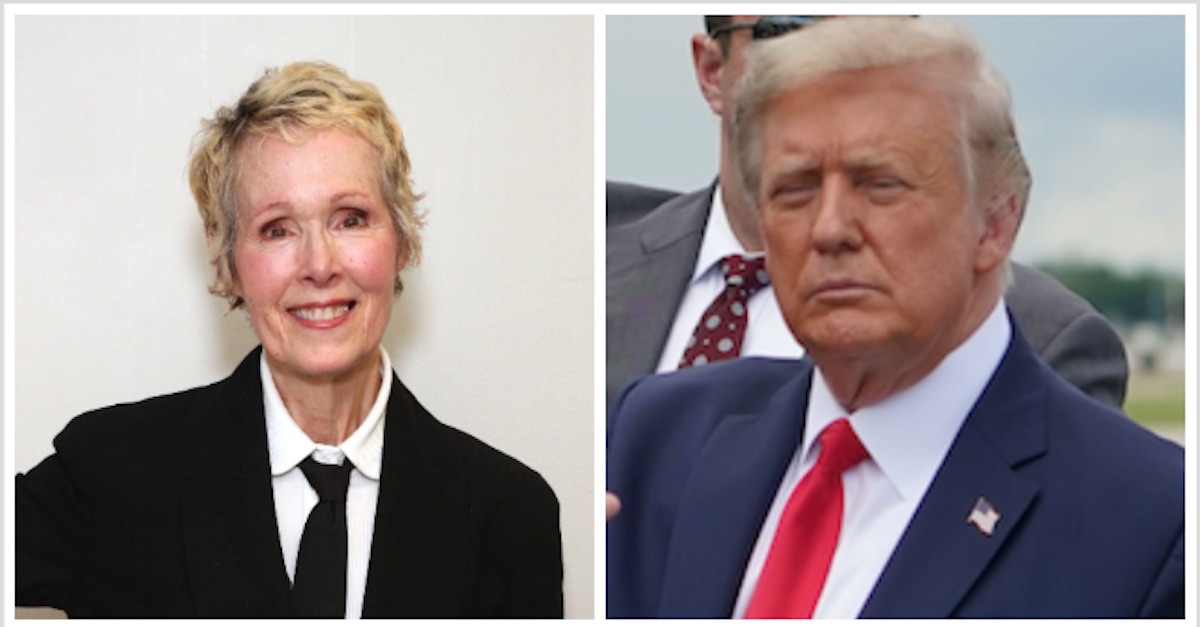
E. Jean Carroll and Donald Trump (Images via Astrid Stawiarz/Getty Images for Glamour, MANDEL NGAN/AFP via Getty Images)
The D.C. Court of Appeals heard oral arguments on Tuesday that will decide whether then-President Donald Trump had been acting under his official duties when he said of rape accuser E. Jean Carroll: “She’s not my type.”
If the top D.C. court finds in Trump’s favor, Carroll’s attorney warned, it would give public officials in the United States a license to smear.
“I believe a lot of reasons to think that Mr. Trump was acting and making these statements on the basis of personal motives, and that this went way beyond — subjectively in his own mind — any desire to serve the interests of the people of the United States or to simply assure people with his fitness for office,” Carroll’s attorney Joshua Matz, from the firm Kaplan Hecker & Fink, said in court.
If the panel finds otherwise, Matz added, “anyone who says something critical of an a public official is at risk of open season on them with essentially complete impunity, which has never been understood to be the law.”
“An Issue of Public Concern”
In June 2019, Carroll stepped forward with her allegations that Trump had sexually assaulted her decades ago in the dressing room of a Bergdorf Goodman. After Trump denied those claims — often, in insulting language — Carroll sued him for defamation, accusing the then-president of smearing her as a liar.
Trump’s lawyer Alina Habba told the panel that Trump did nothing more than answer questions from reporters.
“He was on the front lawn being asked questions. He answered those questions,” Habba said. “I think that the press asking him an inquiry shows that it’s an issue of public concern.”
Since Carroll stepped forward, Trump has denied the allegations against him. Habba argued that Trump was acting within the scope of his employment when he “speaks to the American people to publicly defend himself against a false accusation.”
But Carroll’s legal team notes that Trump’s defense went far beyond mere denial.
Matz argued that Trump’s remarks to reporters contained “certain objective features” showing their “inflammatory, shocking personal character.”
“If someone says, ‘You raped me,’ and I say, ‘Well, you’re unattractive. Who’d have raped you?’ that that suggests something more than business as usual in terms of the business of the government of the United States,” Matz said.
“That’s not exactly what he said,” one judge on the panel responded.
Acknowledging that he was “embellishing” Trump’s remarks, Matz added that the character of the former president’s remarks show “evidence of some degree of motivation that goes beyond job-related: accusing her of having been paid off, engaging in some kind of conspiracy, of having falsely accused others — on the basis of absolutely nothing whatsoever.”
Lawsuit likely to survive in some form
However the court answers that question, Carroll’s lawsuit against Trump is likely to survive in some other form.
Since the alleged assault occurred in the mid-1990s, the statute of limitations had then expired for Carroll to confront those claims directly. The Department of Justice, then led by Attorney General Bill Barr, sided with Trump, arguing that he should be immune from the lawsuit under the Westfall Act. Barr’s successor Merrick Garland continued to adopt that position.
The Justice Department’s attempted intervention led to the lawsuit’s transfer from state to federal court, where a trial court judge rejected the government’s attempts to intervene in the case. The Second Circuit Court of Appeals, however, partially overruled him and punted one of the key questions to the top local appellate court in Washington, D.C.
However the D.C. Court of Appeals rules, Carroll’s lawsuit is likely to continue because she filed two new claims. After the passage of New York’s Adult Survivors Act, Carroll accused Trump of sexual battery directly, taking advantage of the law’s temporary suspension of the statute of limitations. She also sued Trump for reiterating his allegedly defamatory comments after his presidency.
During the hearing Tuesday, Caroline Van Zile, the solicitor general at the Office of the Attorney General for the District of Columbia, said the statements the former president made were out of a “personal” and “selfish” motive.
“Over and over in this case, both in their briefs and in the argument before this court, the Department of Justice and President Trump return to a single theme, that speaking to the press is part of the job of the president, and an obligation of the office, and as we’ve been discussing here, that is true, but it’s only half of the story.”
A trial has been scheduled to take place in April.